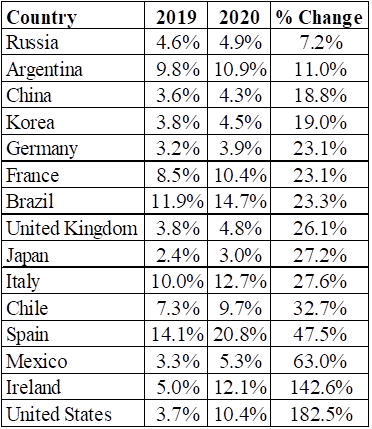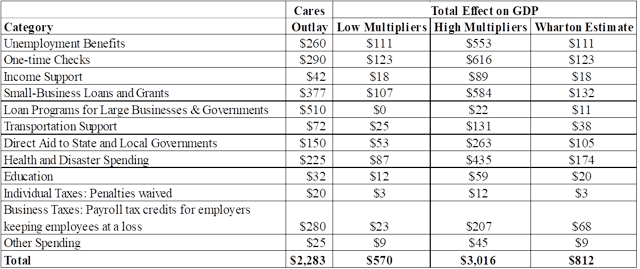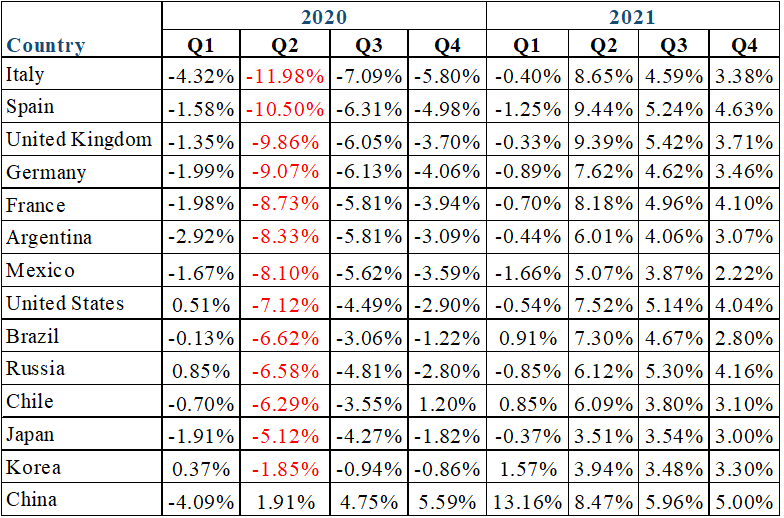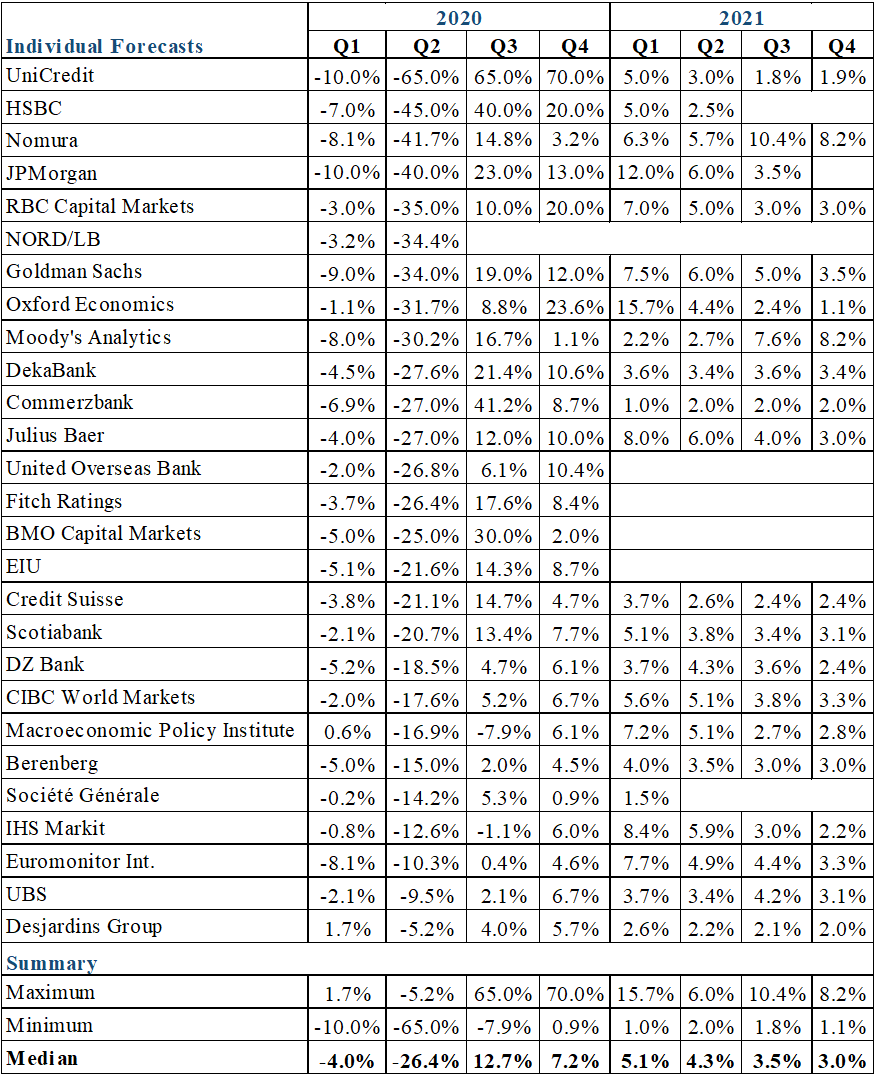
- All Instrument Types
- Indices
- Equities
- ETFs
- Funds
- Commodities
- Currencies
- Crypto
- Bonds
- Certificates
Please try another search

Which stocks will surge next?
Economic Depression: How Bad Will It Get, What Stimulus Efforts Will Help?

Summary
- The US is now in a self-imposed depression that will rival what happened in 1929.
- This is documented for the US and globally.
- The impact of economic policies to counter the depression is also discussed.
Introduction
Things are bad globally and locally. We hear a lot about the US $2 trillion stimulus package. The package is examined with this question addressed: Is this the best way to get back to full employment?
How Bad?
FocusEconomics does a monthly economic survey of countries. Over the last few months, these surveys have gotten progressively grimmer. And with the exception of China, the listed countries are now in their worst quarter (April–June). A number of European countries - Italy, Spain, the UK, France and Germany - were hit the hardest.
China was hit earlier and is now starting to recover. Rebounds in other countries are not seen until the middle of 2021.
Table 1. – Projected Changes in GDP
For its projections, FocusEconomics draws on a wide range of economic experts. Their projections for the U.S. are given in Table 2. Perhaps most noticeable is the opinion diversity. For example, UniCredit is projecting GDP to fall 65% (!) in the second quarter. In contrast, the Desjardins Group sees GDP falling a more modest 5.2%.
Table 2. – US GDP Projections
Another key measure of economic well-being is unemployment. US unemployment was 4.4% or 7.24 million just before the pandemic took hold. In the last 4 weeks, 22 million have filed for unemployment benefits, bringing the total to 29.24 million or an unemployment rate of 17.8%.
The International Monetary Fund (IMF) and others make unemployment projections by country. Table 3 provides their last projections on a number of countries. Their data suggest that Ireland and the US will be the hardest-hit by the virus.
Table 3. – Projected Unemployment Rates

Stimulus Mechanisms
What can be done to counter the coming downturn? There are several ways to stimulate the economy. The Federal government can lend or take steps to reduce interest rates. In today’s circumstances, such actions will not help much. Nobody really wants to borrow whatever the interest rate. The government policies with the greatest stimulus impact are cash payments to individuals and institutions.
This is all nicely summarized in the following table from the Penn/Wharton Budget Model applied to the CARES Act where projections using three different multipliers are illustrated. I quote from the PWBM write-up:
Although lower-income and recently unemployed households will spend a large share of their stimulus benefits, there are limits on the effects of the stimulus because many sectors are simply unable to meet demand due to stay-at-home orders. Therefore, for programs that deliver money directly to households that fall into categories such as transfers to persons and one-year tax cuts for higher-income people, PWBM picks multipliers that are at the bottom of the ranges shown in the following table.
Direct government spending on goods and services, focused primarily on infrastructure and healthcare, will likely stimulate more demand in the current environment. A large fraction of this money is directed to cash-strapped state governments and healthcare facilities that will quickly spend the money. Therefore, PWBM applies fiscal multipliers that are slightly above the bottom of values shown in Table 1 for the following categories: purchases of goods and services by the federal government, transfer payments to state and local governments for infrastructure and other "shovel ready" projects.
Table 4. – PWBM Multiplier Impact of CARES Act

Economic Impact
Wharton concludes: "The CARES Act will produce around 1.5 million additional jobs by 2020 Q3 and increase GDP by $812 billion over the next two years." However, it is important to keep in mind that mitigation policies will interfere with these projections. As long as they are in place, the economic situation will continue to deteriorate.
Budget Implications
$2.3 trillion is a lot of money – about 11% of this year’s US GDP. Two other bills with projected outlays of $8.3 billion and $1.3 billion add a bit more. On these new outlays, I quote from the Committee on Responsible Budget:
These projections almost certainly underestimate deficits, since they assume no further legislation is enacted to address the crisis and that policymakers stick to current law when it comes to other tax and spending policies. The projections also assume the economy experiences a strong recovery in 2021 and fully returns to its pre-crisis trajectory by 2025. Assuming a slower and weaker recovery (but no changes in law), we estimate debt would grow to 117 percent of GDP by 2025.
Our latest projections find that under current law, budget deficits will total more than $3.8 trillion (18.7 percent of GDP) this year and $2.1 trillion (9.7 percent of GDP) in 2021. We project debt held by the public will exceed the size of the economy by the end of Fiscal Year 2020 and eclipse the prior record set after World War II by 2023.
It is worth noting that having debt greater than GDP is not that unusual among developed nations: Belgium - 107%, France – 106%, Greece – 184%, Spain – 104%.
Investment Implications
There is simply too much uncertainty to be too specific with recommendations. However, at some point, the economy will recover. In the meantime, look for dividend stocks with low payout ratios to buy later.
Related Articles

The latest retail sales data suggests a robust consumer, leading economists to become even more optimistic about more robust economic growth this year. To wit: “It has been...

GDP and PCE inflation data disappointed yesterday. This data raises the question: will it be possible to beat inflation without triggering a recession? Meanwhile, the US dollar has...

US 10-Year moved sharply higher on surprise GDP report. What's next? Original Post
Are you sure you want to block %USER_NAME%?
By doing so, you and %USER_NAME% will not be able to see any of each other's Investing.com's posts.
%USER_NAME% was successfully added to your Block List
Since you’ve just unblocked this person, you must wait 48 hours before renewing the block.
I feel that this comment is:
Thank You!
Your report has been sent to our moderators for review






Add a Comment
We encourage you to use comments to engage with other users, share your perspective and ask questions of authors and each other. However, in order to maintain the high level of discourse we’ve all come to value and expect, please keep the following criteria in mind:
Enrich the conversation, don’t trash it.
Stay focused and on track. Only post material that’s relevant to the topic being discussed.
Be respectful. Even negative opinions can be framed positively and diplomatically. Avoid profanity, slander or personal attacks directed at an author or another user. Racism, sexism and other forms of discrimination will not be tolerated.
Perpetrators of spam or abuse will be deleted from the site and prohibited from future registration at Investing.com’s discretion.